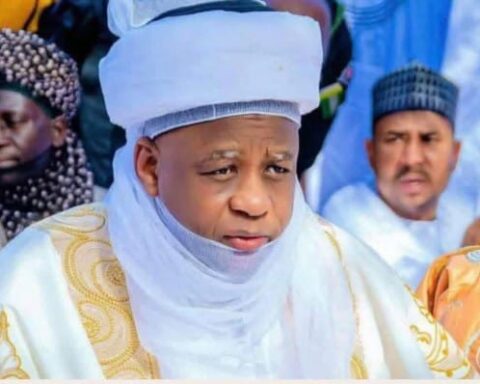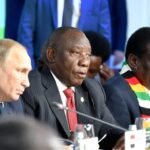The management of the Abuja National Mosque has made history with the appointment of Professor Iliyasu Usman as the first-ever Igbo Muslim to serve as an Imam at the mosque.
This milestone event is set to take place during today’s Jumu’ah (Friday) prayer, where Prof. Usman will deliver his inaugural khutbah (sermon), marking a significant moment not only for him but for the entire Nigerian Muslim community.
Prof. Usman’s appointment has been met with widespread celebration, particularly from the South East Muslim Organisation of Nigeria (SEMON), a body representing Muslim faithful from the southeastern region of the country.
In a congratulatory statement, SEMON praised Prof. Usman’s appointment as a reflection of his tireless dedication to Islamic scholarship and leadership.
The organization emphasized that this achievement is not just a personal triumph for the newly appointed Imam, but also a divine responsibility to guide the Muslim community in both worship and service to Allah.
SEMON further noted that Prof. Usman’s appointment exemplifies the inclusiveness and unity fostered by the Nigerian Supreme Council for Islamic Affairs (NSCIA) under the leadership of the President-General and Sultan of Sokoto, Alhaji Muhammad Sa’ad Abubakar.
The group expressed hope that Prof. Usman’s new role would serve as an inspiration to the Igbo Muslim community and strengthen bonds of unity within the wider Muslim population across Nigeria.
The historic nature of this appointment has attracted considerable attention, with many Muslims across the country expected to gather at the Abuja National Mosque to witness Prof. Usman deliver his first sermon as an Imam.
His inclusion in the leadership of the mosque highlights the diversity within the Nigerian Muslim community, a characteristic that SEMON emphasized in their statement, enthusing that his appointment not only uplifts the Igbo Muslim community but also fosters a spirit of unity and cooperation within the broader Nigerian Muslim society.
Prof. Usman will now join the team of Imams responsible for leading prayers at the Abuja National Mosque, which includes Prof. Ibrahim Makari and Prof. Muhammad Kabir. The three will rotate in leading the daily and Friday congregational prayers.
Another Imam, Sheikh Ahmad Onilewura from the southwestern region of Nigeria, has been on extended sick leave, leaving Prof. Usman as a vital addition to the mosque’s leadership.
SEMON’s statement went on to commend the inclusivity demonstrated by this appointment, describing it as a bold step towards further integrating the diverse Muslim communities across the country.
“We, the South East Muslim Organisation of Nigeria (SEMON), extend our heartfelt congratulations to Professor Iliyasu Usman on your recent appointment as an Imam of the National Mosque, Abuja,” the statement read.
They also noted that Prof. Usman’s appointment carries a divine blessing and a significant responsibility, adding, “This prestigious role is not only a testament to your unwavering dedication and scholarly excellence but also a divine blessing and responsibility to lead the Ummah in worship and service to Allah.”
In their concluding remarks, SEMON offered prayers for the new Imam’s success. “We pray that Allah (SWT) grants you the wisdom, strength, and steadfastness to discharge this sacred duty with diligence, integrity, and humility. May your leadership inspire unity, peace, and piety within the community.”
The appointment of Professor Iliyasu Usman, an Igbo Muslim, as an Imam of the Abuja National Mosque is a significant development that could influence national affairs in several key ways, particularly regarding inclusivity, inter-ethnic harmony, and national unity.
For instance Nigeria is a diverse country with over 250 ethnic groups and multiple religious affiliations, but ethnic and religious tensions have historically been a challenge.
By appointing an Igbo man to a prominent religious position in a predominantly non-Igbo leadership, the Nigerian Supreme Council for Islamic Affairs (NSCIA) is sending a powerful message about unity across ethnic lines. This act could help bridge the cultural and religious divide between the predominantly Christian Igbo in the southeast and the Muslim-dominated north, encouraging greater cooperation and harmony between different ethnic and religious communities.
The Igbo Muslim community has long felt underrepresented in both religious and political spheres in Nigeria. Historically, Igbo Muslims have been a minority within their ethnic group, and this often led to exclusion from leadership positions in national Islamic affairs.
Professor Usman’s appointment is a victory for Igbo Muslims, as it signals recognition and inclusion in the religious leadership of one of the most significant Muslim institutions in Nigeria, the Abuja National Mosque. This newfound representation could inspire other minority Muslim communities, not just in the southeast, but across Nigeria, to pursue more active roles in both religious and national affairs
Nigeria’s religious landscape is often characterized by tension between Muslims and Christians, particularly in areas where ethnic and religious identities are closely linked. As an Igbo Muslim leader, Professor Usman has the unique potential to play a critical role in fostering dialogue between Muslims and Christians. His position as an Imam, combined with his Igbo identity, allows him to mediate in inter-religious conflicts, particularly in the southeastern region. His leadership could foster understanding and tolerance, creating a platform for peaceful coexistence.
Professor Usman’s elevation to such a high-profile religious role empowers the voice of minority groups within Nigeria. His leadership sets a precedent that ethnic or regional background should not be a barrier to attaining national significance in religious or other leadership roles. This could encourage other underrepresented groups to aspire to leadership positions in national religious and political institutions, broadening the spectrum of voices influencing national discourse.
Having an Igbo man in a high-ranking role at the Abuja National Mosque could lead to subtle shifts in how national Islamic institutions operate, with a greater emphasis on diversity and regional representation. It may encourage the Nigerian Supreme Council for Islamic Affairs to take more proactive steps in promoting ethnic and regional inclusiveness in other religious institutions across the country. This change could also influence national policies related to religious matters, particularly in creating policies that reflect Nigeria’s diversity.
Prof. Iliyasu Usman’s appointment as the first Igbo Muslim Imam of the Abuja National Mosque is indeed a monumental step forward in recognizing the contributions of southeastern Muslims to the Nigerian Islamic community and fostering a more inclusive religious leadership at one of the country’s most significant religious institutions.



























